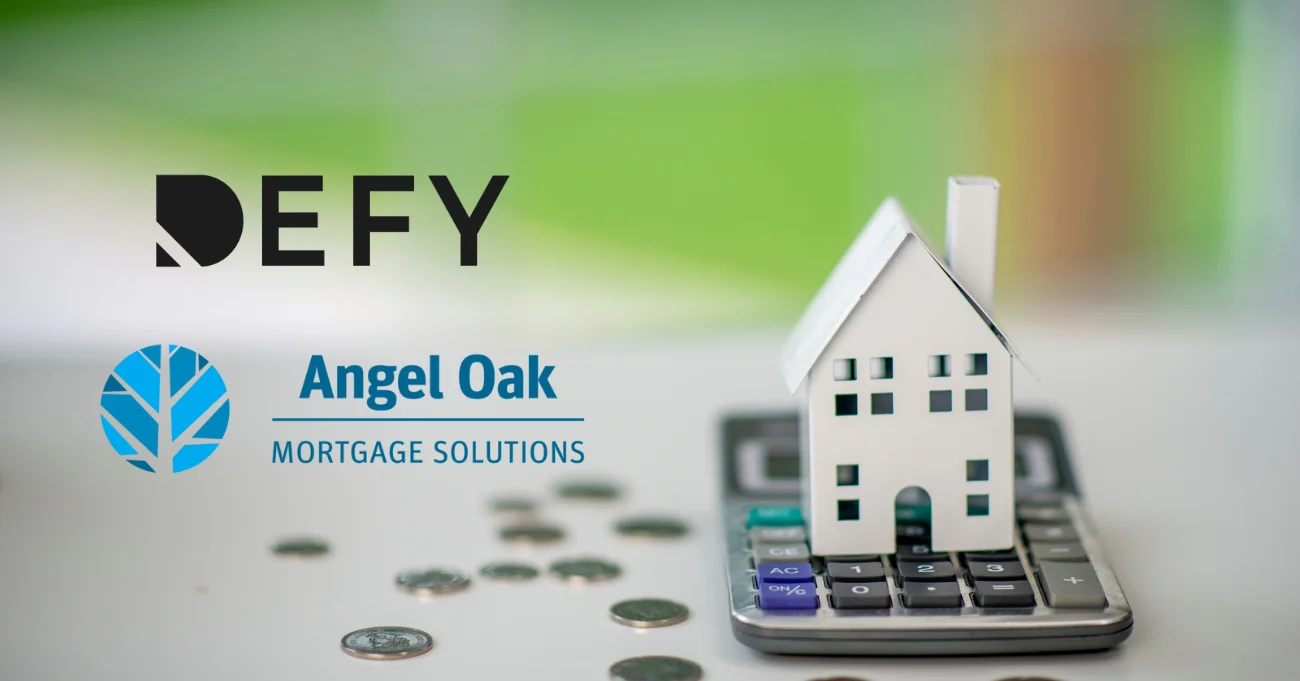DSCR loan Wisconsin offers a convenient and flexible way to finance income-generating properties, especially for people with irregular income sources, such as real estate investors and self-employed individuals.
DSCR loan programs focus on a property’s cash flow more than the borrower’s income, enabling investors to purchase high-value properties without needing a traditional income. Properties exhibiting favorable income levels can get loan terms much more favorable than traditional mortgages.
At Defy Mortgage, we offer more than 75 comprehensive mortgage solutions that are fully customizable to fit any borrower’s specific needs. With both conventional loan options and non-QM options like DSCR loans and portfolio loans, we have helped scores of borrowers achieve their financial goals.
Using our years of experience in DSCR loans, we’ve written this blog to explain how DSCR loans Wisconsin work. We’ll review the criteria you must meet to qualify for this loan type and discuss the factors affecting DSCR loan rates.
Let’s dive in!
Eligibility Criteria for DSCR Loans Wisconsin
The eligibility criteria for a DSCR loan Wisconsin involves the same key DSCR loan requirements as in any other part of the country. The primary factors are the property’s debt service coverage ratio (DSCR) and type, the borrower’s credit score, and other financial details.
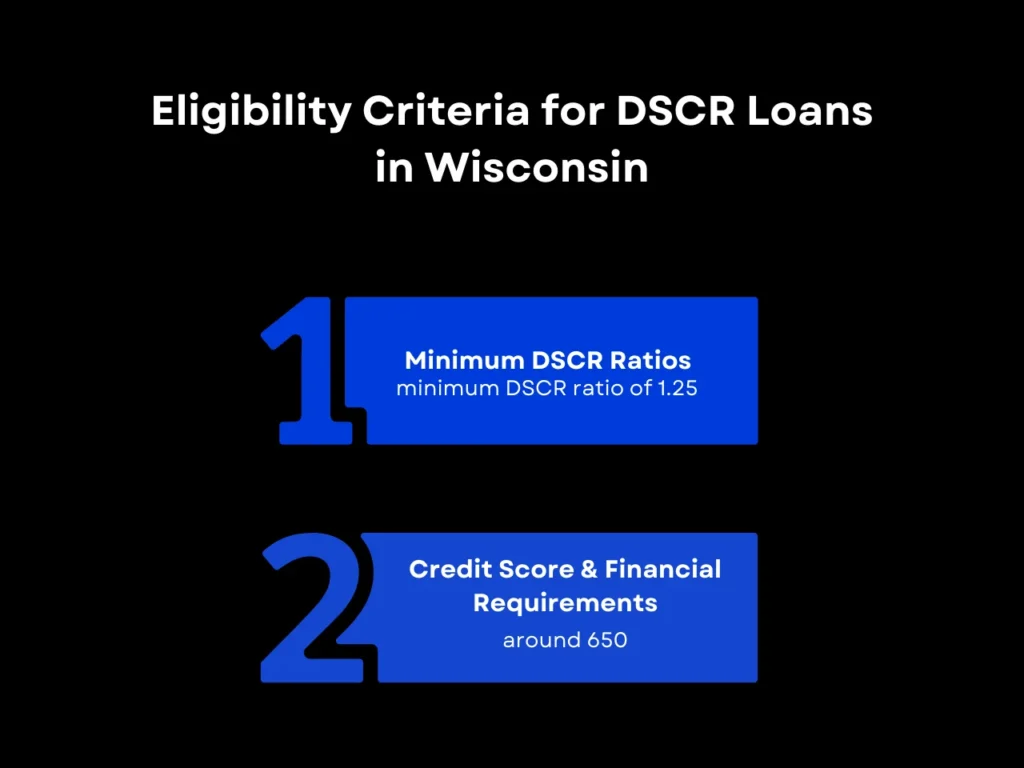
Minimum DSCR Ratios Required
DSCR, or Debt Service Coverage Ratio, is a critical metric lenders use to assess a borrower’s ability to repay a loan based on income generated from the property. A minimum DSCR ratio of 1.25 is typically required, meaning that your property’s annual income should cover 125% of your annual debt obligations.
The DSCR ratio indicates financial stability and ensures that investors can comfortably manage their loans even if rental income decreases due to vacancies or late tenant payments. At Defy, however, we understand that some properties can take a while to generate peak income consistently, so we offer DSCR loans for properties with as low as 0.75 DSCR.
Credit Score and Financial Requirements
Most lenders require a minimum credit score of around 650 for a DSCR loan. At Defy, we look for a minimum FICO score of 620 for DSCR borrowers.
Additionally, although DSCR lenders focus less on borrowers’ finances, they may still evaluate their other financial qualifications, including income stability, asset verification, and cash reserves. Lenders can use various documents to verify these details, such as bank and income statements, but at Defy, we don’t ask our borrowers to provide tax returns or W-2 income. We also offer options for foreign nationals with no US credit score or social security number options.
Verifying a borrower’s finances allows lenders to safeguard their investment in the event of a default, especially if the property’s DSCR is lower than their minimum requirement. However, presenting a solid financial profile is still advantageous regardless of your property’s DSCR to secure the most favorable terms possible.
Property Types Eligible for DSCR Loans in Wisconsin
Generally, any property that generates income can qualify for a DSCR loan. These can be categorized into three main types:

1. Residential Properties
DSCR loans can purchase residential properties from single to multi-family homes. Residential properties can be very consistent sources of rental income, especially if you can attract long-term tenants.
Most lenders limit DSCR loans to properties with up to 4 units. Manufactured homes and homes intended to be primary homes with single-room rentals are also generally ineligible.
2. Commercial Properties
A DSCR loan can be obtained for any commercial property that generates rental income from businesses that need an office or retail space. This can include everything from office buildings to shopping centers. Demand for office and retail space can fluctuate depending on the area’s market conditions, so it may be best to lean towards commercial properties in thriving markets like the areas around Milwaukee and Madison.
3. Mixed-use Properties
Properties that combine commercial and residential properties can also be purchased with a DSCR loan. DSCR for this type of property is usually calculated using the rental income from the rental and commercial units. To find a property with a high DSCR, it may be best to focus on properties that exhibit high income from their commercial or residential units or equal rental income from both.
DSCR Loan Terms and Features
If you’re considering a DSCR loan Wisconsin, it’s essential to understand the terms and features that may impact your investment. Doing so will help you make informed decisions to maximize your returns.
Loan Term Lengths and Their Impact
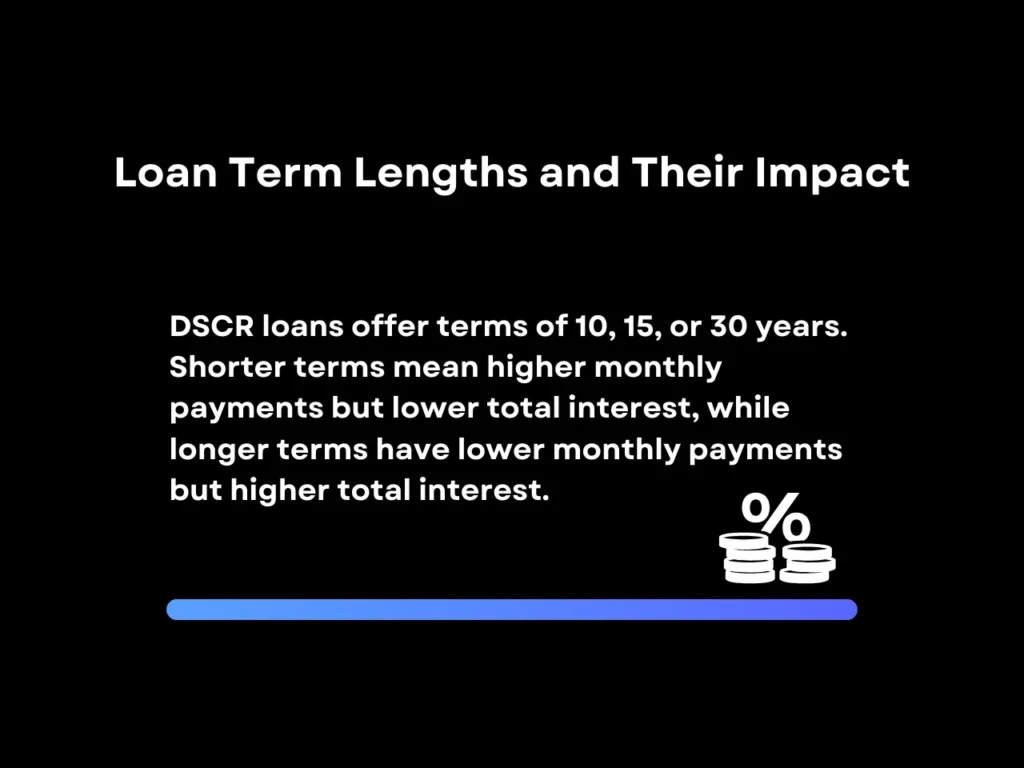
DSCR loans typically offer 10, 15, or 30 years. The choice of term length can significantly impact monthly payments and overall interest costs. Shorter terms may have higher monthly payments but lower overall interest, while longer terms generally have lower monthly payments but higher total interest over time.
Fixed vs. Adjustable Rates: What to Choose?
The choice between fixed and adjustable-rate DSCR loans usually depends on what you need more throughout the life of your loan. Fixed rates provide stability and predictability in monthly payments since the monthly interest payments are the same from the first month to the last.
On the other hand, adjustable rates can offer lower initial payments thanks to their low introductory rate, which can lead to significant savings in the loan’s earlier years. However, after the introductory period is over, the actual interest rate kicks in.
This mortgage rate can increase or decrease over time depending on market conditions and thus can be better for the borrower if the economy is performing well. However, economic downturns can do the opposite, drastically raising your monthly payments and lowering your property’s DSCR, leading to suboptimal terms if you refinance.
Adjustable rates can be advantageous if you want to maximize profits early on and can continue to be beneficial if economic conditions align. However, in periods of market volatility, the stability of fixed-rate DSCR loans can outweigh the benefits of adjustable-rate DSCR loans. Ultimately, the decision between the two should align with your investment strategy and market conditions.
Understanding Prepayment Penalties and Fees
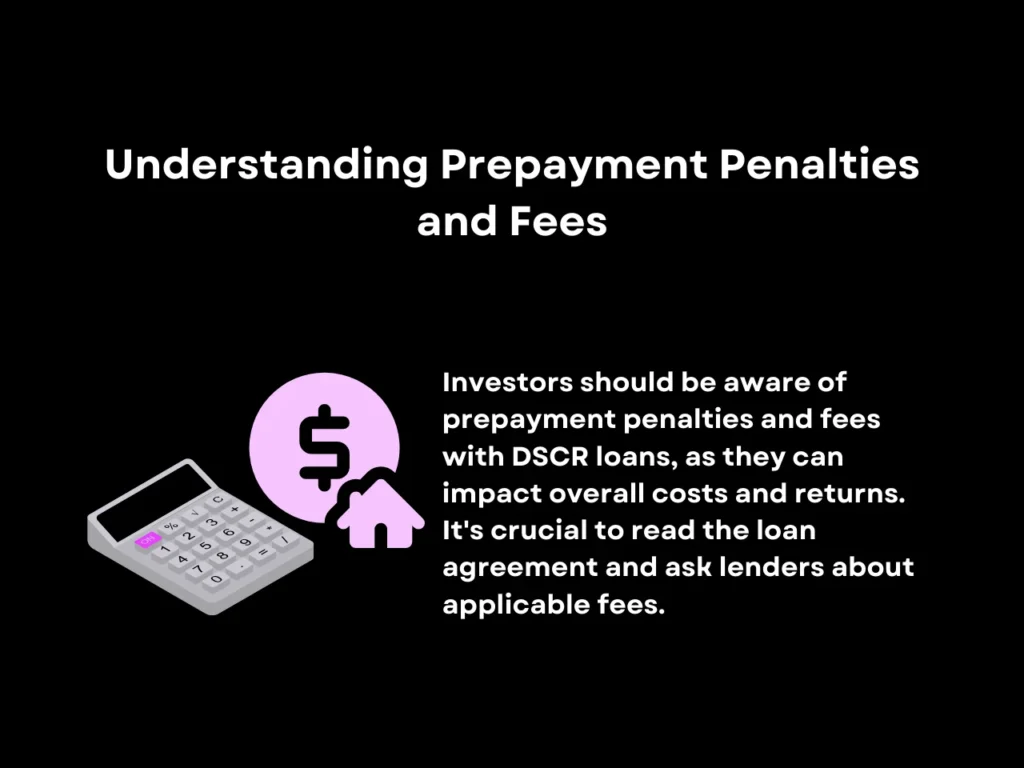
Investors should know common prepayment penalties and fees associated with DSCR loans. These penalties can impact the overall cost of the loan and affect investment returns. It’s crucial to read the loan agreement carefully and ask lenders about applicable fees.
Estimating Your DSCR Loan Interest Rates
A DSCR loan’s interest rate tends to vary from lender to lender, but there are some ways you can estimate the interest rate you will have to pay for a particular DSCR loan. Determining your DSCR loan interest rates involves looking up your preferred lender’s standard rates and understanding the factors influencing them.
Step-by-Step Guide to Estimating Your Rate
You can understand DSCR loan interest rates accurately by considering how a particular lender adjusts rates depending on certain factors. Follow these steps to estimate how much you might have to pay in interest:
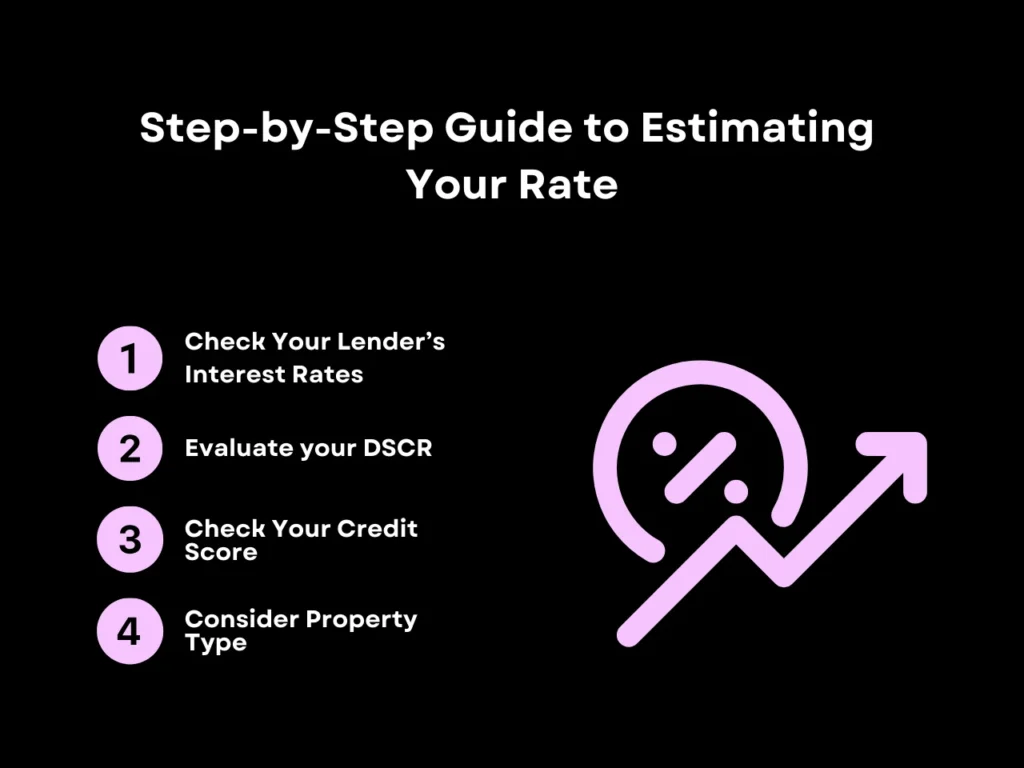
- Check Your Lender’s Interest Rates: Many lenders list a base DSCR interest rate for a particular state or area on their site. Region-based rates are estimates based on the real estate market in the area at large. Still, your rate can change depending on the favorability of the county or local market you want to purchase.
- Evaluate your DSCR: A quick way to determine if your property has a DSCR above 1.0 is to check if it makes enough money to pay off a DSCR loan. If it makes 20% more than it needs, its DSCR is 1.2.
- Check Your Credit Score: A higher credit score typically results in lower interest rates. Even though there’s much less emphasis on personal finances, lenders still look for good credit to indicate that you’re a safe investment.
- Consider Property Type: Different real estate property types may attract different rates. Rental properties present the least risk because of the consistency in their income, leading to lower rates. Still, other property types may also invite a lower rate if they’re particularly lucrative in your area.
Although you may not be able to calculate the exact interest rate, you would have for a particular DSCR loan, looking up your lender’s base DSCR rate and considering your DSCR, credit score, and property type in the context of your local market can give you a good idea of how much your hypothetical loan will deviate from that base rate.
Comparing Wisconsin Rates to National Averages
Current DSCR loan interest rates in Wisconsin start at 6.125%, while the national average is 7.10%. Keep in mind, however, that DSCR loans seldom get the lowest possible rate in a given area due to various market factors that can increase the rate. The average DSCR loan in Wisconsin will likely have a rate lower than but approaching the national average.
The lower rates in Wisconsin can be due to the increasing popularity of Wisconsin as a place to live, raising housing prices, and rental income in the state. This has led some lenders to lower their rates and invite investment using DSCR loans. Commercial real estate is also seeing a boom in Wisconsin, with several key sectors driving developments that increase property value and overall DSCR ratios. With the higher demand for housing, mixed-use developments are also becoming more lucrative.
DSCR Loan Wisconsin FAQ
Can I qualify for a DSCR loan with a low personal credit score?
While a low credit score may limit options, some lenders offer DSCR loans with flexible credit requirements.
How does rental income affect my DSCR loan eligibility?
Rental income is crucial in determining your DSCR and overall loan eligibility.
What are the minimum and maximum loan amounts for DSCR loans in Wisconsin?
Minimum and maximum loan amounts vary by lender, with $100,000 being a common minimum amount. Maximum amounts range from $2 million to $4 million, with some reporting more.
Are there specific property types that are ineligible for DSCR loans?
Typically, owner-occupied properties are not eligible; lenders focus on investment properties. Manufactured homes and multi-family homes with over 4 units are also ineligible. Some lenders can go up to 10 units, but those with more than 11 units fall under the domain of commercial real estate loans.
How do federal rate changes impact DSCR loan rates?
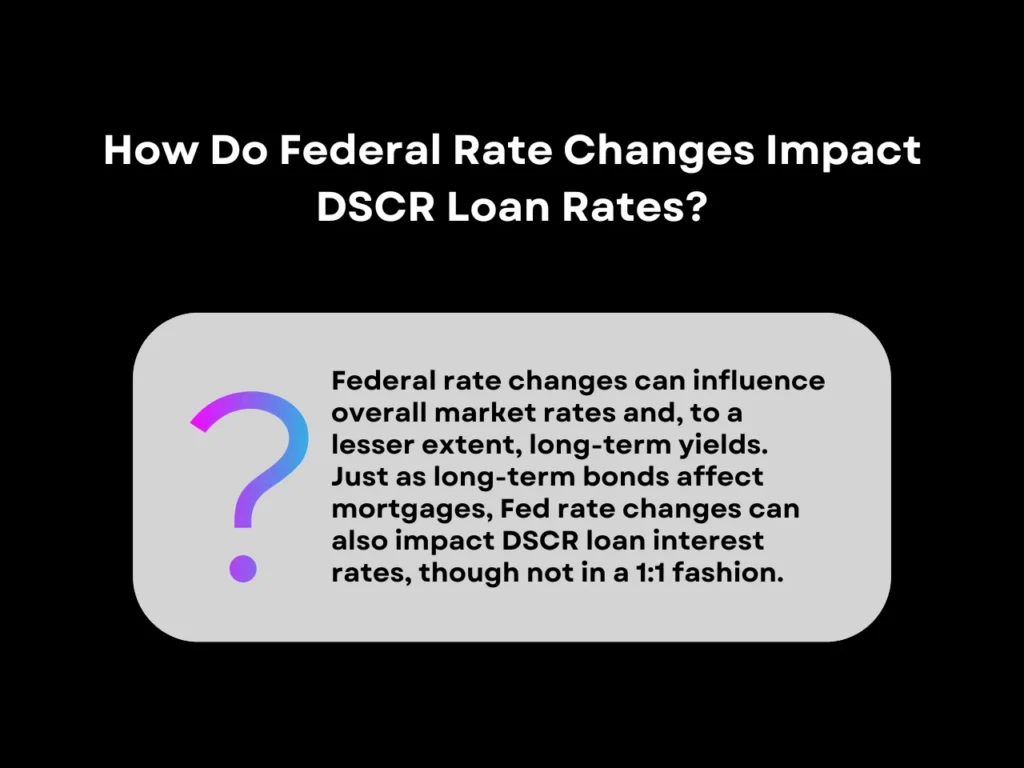
Federal rate changes can influence overall market rates and, to a lesser extent, the yields on long-term financial instruments. Just as long-term bonds affect mortgages, changes to the Fed rate can also subsequently affect DSCR loan interest rates, although not in a 1:1 fashion.
Future Trends in DSCR Loans for Wisconsin Investors
Wisconsin has been experiencing rapid growth in its commercial property market, with areas around major cities like Milwaukee and Green Bay seeing a surge in commercial space demand, construction activity, and property values. Milwaukee, in particular, is becoming a hotspot for tech startups and corporate expansions, which has led to a high demand for office and industrial spaces.
In the residential sector, mixed-use developments are increasing in popularity, with cities like Madison using them to simultaneously address the twin challenges of creating infrastructure for a growing population and staying abreast of urban living trends. Rental property investors can also take advantage of the sustainability incentives in Wisconsin’s major cities, earning them financial credits while potentially driving down utility costs.
Key Takeaway
DSCR loan Wisconsin can be the most effective financial tool for diversifying your portfolio with lucrative income-producing properties. With high maximum amounts and no cap on how many DSCR loans you can have at one time, a keen-eyed investor making the right investments can see a high net return even through dips in rental income.
If you’re interested in a DSCR loan in Wisconsin, ensure your chosen property’s DSCR ratio is higher than your lender’s preferred minimum. Keeping your credit score high will help you secure favorable loan terms. Paying attention to current economic trends affecting Wisconsin’s real estate market can help you pick out optimal properties, improving your chances of getting the best loan terms and maximizing your profits.
Are you curious about your investment property loan options? Start a conversation with Defy to learn about financial products to help you get the most out of your property investments, from DSCR loan Wisconsin options and construction loans to secondary mortgage options like home equity loans for investment properties.


